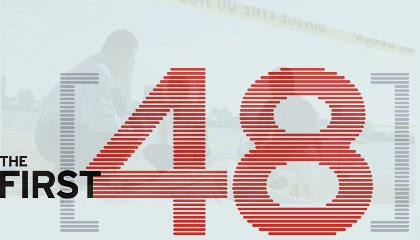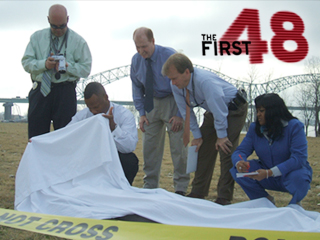
‘THE FIRST 48’
Videographer Tom Bailey, working for the A&E true-crime series “The First 48,” records the court proceedings last month involving defendant Frederick Davis, one of several Louisville cases the TV show has followed.
Cameras complicate judicial matters, even after filming ends
By Jason Riley
jriley@courier-journal.com
The Courier-Journal
When A&E’s true-crime show “The First 48” aired a story about the January 2009 murder of Louisville resident William Waggener, it gave viewers behind-the-scenes access to metro police homicide detectives in the investigation’s first days.
But attorneys for Gary Lindsey, who was arrested for the murder, say “The First 48” didn’t just document the investigation, it became a part of it.
The defense argues that the show filmed witnesses police hadn’t spoken to or didn’t record, captured the officers’ first contact with other crucial witnesses, recorded interrogation strategies and created an environment in which events were exaggerated or manipulated for better TV.
“We think one of the reasons our man is sitting here is he was a part of a TV show,” defense attorney Rob Eggert told Jefferson Circuit Judge Susan Schultz Gibson in a hearing last year.
Lindsey, who was indicted on a charge of murder and tampering with physical evidence, has pleaded not guilty.
Eggert and his co-counsel, Paul Gold, have complained in court records that “many of the critical facts concerning the investigation were discovered by defense counsel only after witnessing the episode of ‘The First 48,'” which first aired in June 2009.
And Gibson has allowed several of the defense’s motions pertaining to the show, ordering prosecutors and police to turn over a copy of the department’s contract with “The First 48.” She also allowed producers to be subpoenaed to come to Louisville and testify during the trial, which is scheduled to begin March 15. The subpoenas are apparently a first in the seven-year history of the show.
“You have to admit that it’s somewhat extraordinary … that the entire initial stages of an investigation are opened up so publicly,” Gibson said in a court hearing.
Producers may testify
“The First 48” began covering the investigation of the Waggener murder on Jan. 27, 2009, the day of the murder, according to court records. Waggener, 45, died of gunshot wounds to the head after he was found that day near 28th and Main streets.
Defense attorneys say the show filmed an interview at the home of a key witness, John Benfield, which was not recorded by police. The interview was described in a report by a detective, according to court records. And the defense said family members of the victim were interviewed by “The First 48,” but not police.
They have subpoenaed two field producers of the show, Matthew Gordon and Gabriel Goodenough, to possibly testify at trial, saying the two were with officers during critical stages of the Lindsey investigation and could provide testimony not only as to what they saw, but refute officer or witness testimony, if necessary.
First Amendment attorneys Jon Fleischaker and Jeremy Rogers, who also represent The Courier-Journal and other media outlets, asked Gibson to quash the subpoenas, arguing that the producers have no relevant information and that forcing them to testify would violate their First Amendment rights.
“This is a quintessential fishing expedition,” they said in court records.
Prosecutors in the Lindsey case have defended “The First 48” and the Louisville Metro Police Department, calling the defense’s focus on the show a “red herring” and saying the investigation was normal, just filmed by an objective private entity that neither directed nor was directed by police.
And they have argued that the commonwealth has turned over all evidence in the case and the testimony of the producers is not necessary or relevant.
“The First 48” will be the subject of more local legal battles in coming months.
Just last month, Jefferson Circuit Judge Irv Maze ordered prosecutors to turn over “all data and material the police provided” from the show as well as a copy of the contract between “The First 48” and police in a different murder case in his division.
The defense attorneys in that case — the Dec. 3, 2009, shooting death of an unidentified Hispanic man — also have asked the judge to exclude not only any potential jurors for the October trial who may have watched the episode about the murder, but also any witnesses for the trial who had seen it.
“We figured it would prejudice jurors and witnesses and may taint their recollections,” said attorney Stephen Ryan, who represents Cedrick Johnson, one of the defendants in the man’s death. “They might change their testimony based on watching the show.”
Maze has not yet ruled on the motion.

Influence questioned
The television show’s influence on court cases since it began filming in Louisville in 2008 has been a hot topic among prosecutors, defense attorneys and
judges — with each affected by the show at some point.
Last month, Assistant Commonwealth’s Attorney Erin White tried to play a clip from “The First 48” in which she said defendant Frederick Davis made an admission of guilt to the show while he was being arrested. The judge did not allow the clip to be played.
And in June, Gibson denied a motion from the Jefferson commonwealth’s attorney’s office to declare a mistrial in a separate murder case after two jurors alleged that another juror during the trial had watched part of an episode of “The First 48” that featured Louisville detectives talking about the murder case. Gibson eventually ruled that the juror’s viewing of the show did not affect the jury’s verdict.
The Baltimore-based program, which focuses on the first two days of a murder investigation, the period widely thought to be most crucial to catching a killer, began in 2004. At the end of each episode, the police usually solve the crime.
The show came under scrutiny last year after a crew following detectives in Detroit taped a raid that left a 7-year-old girl dead. Police accidentally shot the girl after bursting into a home in search of a murder suspect. The killing raised questions about whether the presence of cameras led officers to act brazenly.
Detroit later canceled its contract with the show.
Louisville Metro Police decided not to renew their contract with “The First 48” at the end of September, although police officials have said they may at some point work with the show again or perhaps join with a different crime show.
“We decided to take a break with it,” Lt. Col. Vince Robison said.
He denied that the decision had anything to do with the scrutiny defense attorneys have been giving the show. Still, Robison acknowledged he took notice of the situation in Detroit.
“I can’t say that doesn’t sit in my head as well,” he said.
A “First 48” representative declined to comment as to why the contract was canceled or what role, if any, the show has played in current murder cases.
Positive portrayal
The police department did not receive financial compensation from “The First 48,” according to the contract. The show’s producer had to provide police a “rough-cut” copy of an episode before it aired, and police had five days to review the tape for any factual inaccuracies.
Robison and others praised “The First 48” for portraying police in a positive light, with Robison pointing out that the show gives citizens the entire view of police work, rather than just a few snippets.
“This shows that we really work on every case, no matter who the victim is,” he said. “I’m a fan of trying to let the public see what we’re doing.”
Assistant Commonwealth’s Attorney Ryane Conroy, who told a judge at a hearing last month that she would turn over to the defense a copy of the show in a murder case she was trying, even though attorneys hadn’t asked for it, said there have “been instances where it has been detrimental to the prosecution.” But she was overall complimentary of “The First 48” and the way the show has portrayed police.
“There is so much bad press on the job cops do,” she said. “This is an accurate view of good work they do on behalf of victim’s families. … They are kind and good and work very hard for people they have never met. It’s not a bad thing the public realizes that.”
Robert Thompson, who studies the impact of television on society at Syracuse University, said there have been studies for several decades that show people behave differently when put in the spotlight.
“If there is a camera on you, you are converted into a performer,” he said.
Thompson added that the cameras can have a positive effect on police, acting as a deterrent to any potential bad behavior. But Thompson said he believes the cameras are a distraction to officers who are armed and making split-second decisions.
“You prefer the police to have as few distractions as possible,” he said.
Reporter Jason Riley can be reached at (502) 584-2197.
Judge Olu Stevens listens last month as attorneys from both sides argue about whether to allow a jury to watch a portion of a video from “The First 48” as part of the evidence presented in Davis’ trial. Ultimately, he ruled against showing the video.
Watch online
For a link to a short clip of an episode of “The First 48,” read the story at www.courier-journal.com
